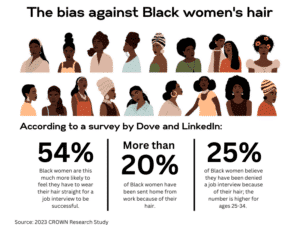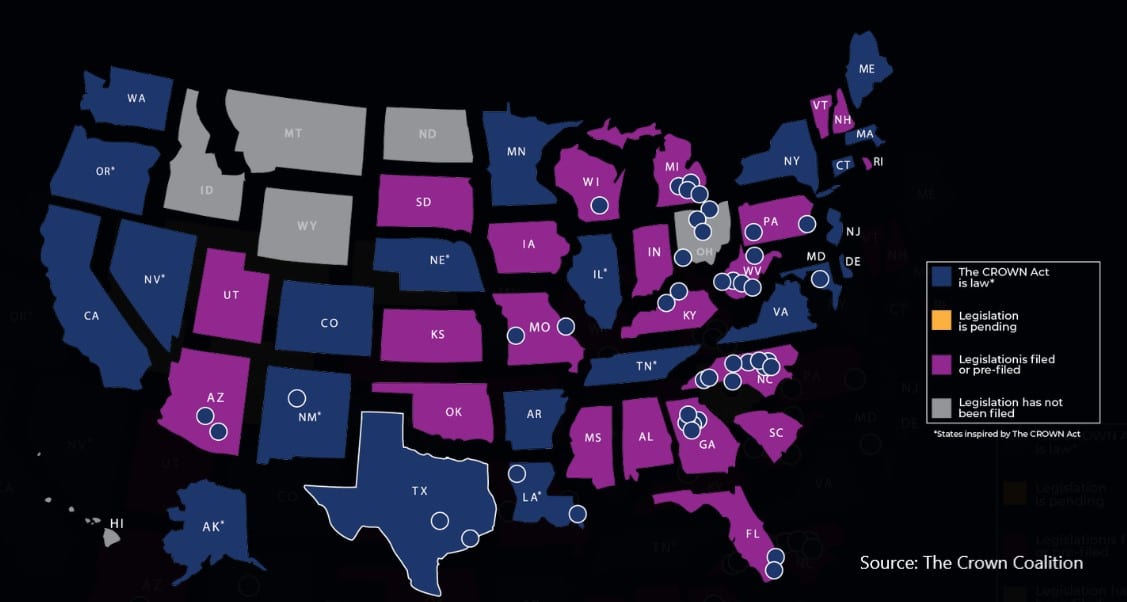In the last four years, 22 states have adopted versions of the Crown Act, first passed in California in 2019 to prohibit employers from discriminating based on hair style and texture that is commonly associated with a particular race or national origin. While legislative support for the anti-discrimination measure moves swiftly, however, employers have been slower to respond, experts say.
“I would say over 90% of employers do not have relevant language and policies in place to stop this kind of discrimination,” Michelle De Leon, founder and CEO of the organization World Afro Day, told HRE.
Leon’s organization recently unveiled a workplace training initiative aimed at reducing discrimination against Black women who wear their hair in afros, braids, twists, dreadlocks and cornrows while at work. The initiative included a short video raising awareness about Black hair texture and styles, seeking to reduce workplace discrimination by educating employers and employees.
“There’s a knowledge gap here,” Leon says, “which is why we’re producing this training. I want employers to think about their environment.”
More than 200 business professionals attended the online launch of the initiative and the group also plans another training session on Sept. 15, in conjunction with World Afro Day.
The impacts of hair discrimination
The discrimination this training seeks to tackle has been happening for decades, according to a report in JSTOR Daily. In 2010, for example, an Alabama Black woman had her job offer at a call center revoked after refusing to cut off her dreadlocks.
And in 2021, the U.S. Equal Employment Opportunity Commission filed a racial discrimination lawsuit against drug and medical testing supplies distributor company American Screening, after it fired a Black worker who wore her tightly curled hair in a bun instead of wearing a wig with straight hair as she did in her job interview. The employer, however, allowed other workers to wear their hair in a bun or ponytail if their hair was not tightly curled.

Many Black people have hair that is highly delicate and prone to breakage and hair loss, De Leon says, and wear hairstyles like cornrows or dreadlocks to protect it. But the hairstyles do more than protect the hair.
“These differences in hairstyles also serve as a statement from an ancestral point of view,” says De Leon. “We have African ancestry and our hair is expressed—and should be allowed to be expressed—based on our ancestry.”
However, two-thirds (66%) of Black women have changed their hair for a job interview, according to a 2023 CROWN Workplace Research Study by Dove and LinkedIn. And of those, 41% straightened their curly hair, the study shows. Alarmingly, roughly 25% of those surveyed said they have been denied a job because of their hair.
“Companies haven’t really defined what it means to bring your whole self to work. It’s just a catchphrase without a definition,” De Leon says. “What many companies actually mean by that is they want you to bring your European version of yourself to work.”
These actions prevent an employee from being their authentic self, thus hurting their emotional wellbeing., according to the study. In addition, chemicals used in some hair straightening products have been shown to interfere with hormones, which can increase risks for diabetes, metabolic syndrome, cardiovascular disease and pregnancy-related complications. The study also found that women who used these hair products reported a higher risk of uterine cancer than those who did not.
22 states pass Crown Act — more next?
World Afro Day’s training effort comes as 23 additional states have Crown Act legislation filed or pre-filed, according to the Crown Coalition.
 At the federal level, the House passed the Crown Act last year, but it was tabled by the Senate Judiciary Committee and has not been reintroduced this term.
At the federal level, the House passed the Crown Act last year, but it was tabled by the Senate Judiciary Committee and has not been reintroduced this term.
Federal law currently treats issues of hair and hairstyles as a cultural issue and not a race issue, unlike laws in the United Kingdom, says De Leon.
As more states consider and pass Crown Act laws, employers and HR leaders would be wise to become familiar with the local legal landscape, says Amy Cann, an employment attorney with McLane Middleton. They also should review their handbooks for inadvertent bias in grooming policies and consider striking any blanket hairstyle bans.
“Employers should not ban hairstyles,” Cann says. They also should not characterize hairstyles or hair textures as “non-professional, messy or unkempt,” she says, noting that historically this was a common rationale employers provided for hairstyle bans.
She estimates that roughly a third of the employers she works with have a grooming policy alongside their dress code policy. She stressed it’s important to eliminate vague language in those, as that is a frequent entry point for hair discrimination.
When developing non-discrimination policies and language, ensure hair protection is included, Cann says. Also, make your recruiting team aware of the policies and provide organization-wide education and training regarding any potential biases around natural hair and hairstyles, she suggests.
“If you ignore these policies and laws, you can certainly get yourself in trouble,” Cann says. “I would encourage employers to educate themselves.”

